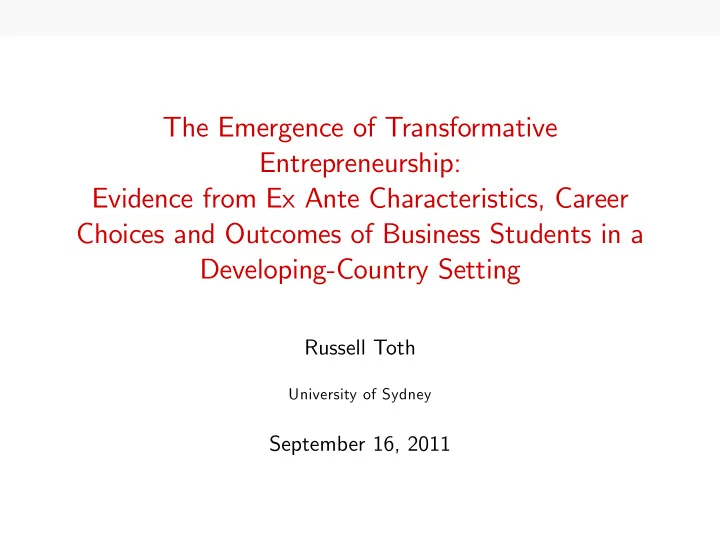

The Emergence of Transformative Entrepreneurship: Evidence from Ex Ante Characteristics, Career Choices and Outcomes of Business Students in a Developing-Country Setting Russell Toth University of Sydney September 16, 2011
Research Questions / Motivation How do high-ability individuals choose an entrepreneurial career path? What are the key psychological and social characteristics related to their occupational choice, and later success (or failure)? Implications for: Promotion of transformational entrepreneurship (higher-growth SMEs). Career selection of high-talent individuals (vs. banking, management, politics, etc.). Understanding early-career in‡uences in career selection and persistence (accumulated HC). Understanding how attitudes and beliefs toward entrepreneurship evolve. Understanding business success and failure.
Research Design Sample objective: close access to high-propensity sample (to enter entrepreneurship), with roughly similar timing. = ) Career trajectories of students at a top technical university in Indonesia. Survey students: (1) During their time as (undergraduate and/or graduate) students. Collect: psychological/expectation, social, demographic, genetic proxy, and educational performance variables. (2) Upon graduation. Collect: occupational choices, expectations about future opportunities and performance, preferences over certain options (e.g., …nancing). (3) Post-graduation. Collect: business outcomes data, occupational trajectories. Exploit in-program "treatments" and randomized information treatments.
More Details of Research Design Key foci: "Control" hypotheses: risk preferences, locus of control, 2D:4D digit span, basic cognitive tests. Belief and expectation-based theories: Optimism versus overcon…dence, through eliciting probability distributions; ambiguity. "Treatments": Role of exogenous provision of information in academic program (e.g., business lab experience). Supplemental information treatments: chances of business success, business environment, feedback from business mentor, information on …nancing options. Formation of attitudes toward entrepreneurial activity (cultural hypothesis). How social and familial connections feed into entrepreneurial choices and outcomes.
Hypotheses and Research Contribution Existing literature addresses a number of the measured characteristics, and they generally go in the expected direction (e.g., risk aversion reduces entry, family ties strongest positive predictor of entry, education positively related to startup of growth-oriented businesses). Most existing studies based on cross-sectional data, which makes interpreting correlations between characteristics and outcomes/choices di¢cult. Contribution here is to remove simultaneity problem in assessing a¤ect of well-known characteristics, and reducing omitted variable bias through collecting a range of variables. The study will break new ground, through sharper tests disentangling optimism and overcon…dence (using FOSD and SOSD of elicited distributions), collecting evidence on evolution of attitudes and entrepreneurial learning, and looking at the role of information.
Information on Sample Population 17,000 students in university overall. In business school, undergrads take 3 years; 4 years in other departments. Graduate programs 18-24 months. Gender. ~55-45 male-female split in business school; larger male majority in some departments (i.e., 60-70% male). A number of relevant departments from which to draw in non-business students. Seemingly high opportunity cost to self-employment (existing students channel into impressive employment opportunities).
Advantages of Study Enthusiastic research partner. Minimize post-graduation attrition: strong alumni association and students highly connected (phone/internet). Reduce sample fatigue by: (1) collecting data in multiple stages, (2) making use of data the school already collects. Elite students, sophisticated in assessing probabilities. A number of possible extensions to the study are available.
Thank you! Russell Toth russell.toth@sydney.edu.au
Literature Amit, R., L. Glosten and E. Muller. 1993. “Challenges to Theory Development in Entrepreneurship Research.” Journal of Mathematical Sociology, 30: 815-34. De Mel, Suresh, David McKenzie and Christopher Woodru¤. 2010. “Who Are the Microenterprise Owners? Evidence from Sri Lanka on Tokman versus De Soto.” In International Di¤erences in Entrepreneurship, Lerner and Schoar (eds.). Kaniel, Ron, Cade Massey and David T. Robinson. Sept. 2010. “The Importance of Being An Optimist: Evidence from Labor Markets.” NBER working paper #16328. Landier, Augustin, and David Thesmar. 2009. “Financial Contracting with Optimistic Entrepreneurs.” Review of Financial Studies, 22(1): 117-150.
Recommend
More recommend